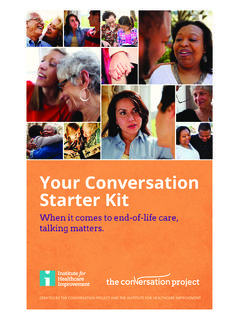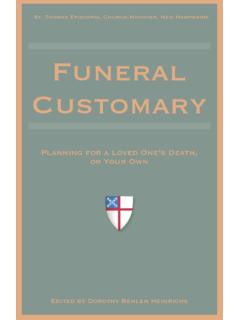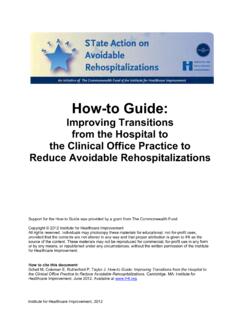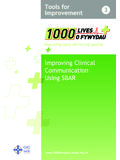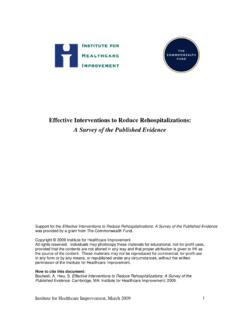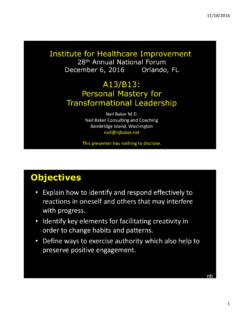Transcription of Your Conversation Starter Kit - The Conversation Project
1 your Conversation Starter KitWhen it comes to end-of-life care, talking BY THE Conversation Project AND THE institute FOR healthcare for healthcare improvement TO USE THE Starter KITThis Starter Kit doesn t answer every question, but it will help you get your thoughts together, and then have the Conversation with your loved can use it whether you are getting ready to tell someone else what you want, or you want to help someone else get ready to share their your time. This kit is not meant to be completed in one sitting. It s meant to be completed as you need it, throughout many OF CONTENTSWhy talking matters.
2 2 Step 1: Get Ready ..3 Step 2: Get Set ..4 Step 3: Go ..7 Step 4: Keep Going ..10 The Conversation Project is dedicated to helping people talk about their wishes for end-of-life know that no guide and no single Conversation can cover all the decisions that you and your family may face. What a Conversation can do is provide a shared understanding of what matters most to you and your loved ones. This can make it easier to make decisions when the time DATE This document does not seek to provide legal advice.
3 2015 The Conversation Project . All rights institute for healthcare improvement talking mattersSharing your wishes for end-of-life care can bring you closer to the people you love. It s critically important. And you can do it. Consider the facts:90% of people say that talking with their loved ones about end-of-life care is have actually done : The Conversation Project National Survey (2013)60% of people say that making sure their family is not burdened by tough decisions is extremely have not communicated their end-of life : Survey of Californians by the California healthcare Foundation (2012) 80% of people say that if seriously ill, they would want to talk to their doctor about wishes for medical treatment toward the end of their report having had this Conversation with their : Survey of Californians by the California healthcare Foundation (2012)82% of people say it s important to put their wishes in have actually done : Survey of Californians by the California healthcare Foundation (2012) institute for healthcare improvement Conversation can make all the difference.
4 For healthcare improvement 1 Get ReadyREMEMBER: You don t need to have the Conversation just yet. It s okay to just start thinking about it. You can start out by writing a letter to yourself, a loved one, or a friend. You might consider having a practice Conversation with a friend. Having the Conversation may reveal that you and your loved ones disagree. That s okay. It s important to simply know this, and to continue talking about it now not during a medical crisis. Having the Conversation isn t just a one-time thing. It s the first in a series of conversations over will have many questions as you get ready for the Conversation .
5 Here are two to help you get started:?? What do you need to think about or do before you feel ready to have the Conversation ? Do you have any particular concerns that you want to be sure to talk about? (For example, making sure finances are in order; or making sure a particular family member is taken care of.) institute for healthcare improvement 2 Get SetWhat s most important to you as you think about how you want to live at the end of your life? What do you value most? Thinking about this will help you get ready to have the finish this sentence: What matters to me at the end of life (For example, being able to recognize my children; being in the hospital with excellent nursing care; being able to say goodbye to the ones I love.)
6 Sharing your what matters to me statement with your loved ones could be a big help down the road. It could help them communicate to your doctor what abilities are most important to you what s worth pursuing treatment for, and what isn I STAND SCALESUse the scales below to figure out how you want your end-of-life care to be. Select the number that best represents your feelings on the given scenario. As a patient, I d like to 1 2 3 4 5 Only the basics about my condition and my treatmentAll the details about my condition and my treatmentAs doctors treat me, I would 1 2 3 4 5 My doctors to do what they think is bestTo have a say in every for healthcare improvement Look at your answers.
7 What kind of role do you want to have in the decision-making process?? Look at your answers. What do you notice about the kind of care you want to receive? If I had a terminal illness, I would prefer 1 2 3 4 5 Not know how quickly it is progressingKnow my doctors best estimation for how long I have to liveHow long do you want to receive medical care? 1 2 3 4 5 Indefinitely, no matter how uncomfortable treatments areQuality of life is more important to me than quantityWhat are your concerns about treatment? 1 2 3 4 5 I m worried that I won t get enough careI m worried that I ll get overly aggressive careWhat are your preferences about where you want to be?
8 1 2 3 4 5 I wouldn t mind spending my last days in a health care facilityI want to spend my last days at institute for healthcare improvement involved do you want your loved ones to be? 1 2 3 4 5 I want my loved ones to do exactly what I ve said, even if it makes them a little uncomfortableWhen it comes to your 1 2 3 4 5 When the time comes, I want to be aloneI want to be surrounded by my loved onesWhen it comes to sharing 1 2 3 4 5 I don t want my loved ones to know everything about my healthI am comfortable with those close to me knowing everything about my health?
9 Look at your answers. What role do you want your loved ones to play? Do you think that your loved ones know what you want, or do you think they have no idea? What do you feel are the three most important things that you want your friends, family, and/or doctors to understand about your wishes and preferences for end-of-life care??1. 2. want my loved ones to do what brings them peace, even if it goes against what I ve for healthcare improvement The next holiday Before my child goes to college Before my next trip Before I get sick again Before the baby arrives The next time I visit my parents/adult children At the next family gathering Other: ?
10 Step 3 GoWhen you re ready to have the Conversation , think about the ALL THAT APPLY: WHAT do you want to be sure to say? If you wrote down your three most important things at the end of Step 2, you can use those here. ? Mom Dad Child/Children Partner/Spouse Sister/Brother Faith leader (Minister, Priest, Rabbi, Imam, etc.) Friend Doctor Caregiver Other: ? WHERE would you feel comfortable talking? At the kitchen table At a favorite restaurant In the car On a walk Sitting in a park At my place of worship Other: ? WHEN would be a good time to talk?
